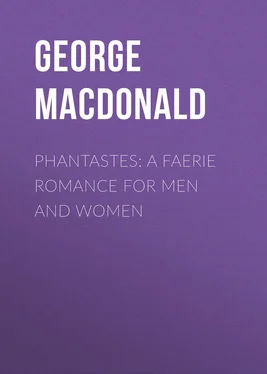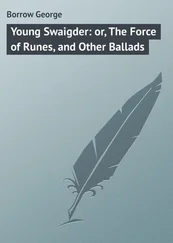George MacDonald - Phantastes - A Faerie Romance for Men and Women
Здесь есть возможность читать онлайн «George MacDonald - Phantastes - A Faerie Romance for Men and Women» — ознакомительный отрывок электронной книги совершенно бесплатно, а после прочтения отрывка купить полную версию. В некоторых случаях можно слушать аудио, скачать через торрент в формате fb2 и присутствует краткое содержание. Жанр: foreign_sf, literature_19, foreign_antique, foreign_prose, на английском языке. Описание произведения, (предисловие) а так же отзывы посетителей доступны на портале библиотеки ЛибКат.
- Название:Phantastes: A Faerie Romance for Men and Women
- Автор:
- Жанр:
- Год:неизвестен
- ISBN:нет данных
- Рейтинг книги:5 / 5. Голосов: 1
-
Избранное:Добавить в избранное
- Отзывы:
-
Ваша оценка:
- 100
- 1
- 2
- 3
- 4
- 5
Phantastes: A Faerie Romance for Men and Women: краткое содержание, описание и аннотация
Предлагаем к чтению аннотацию, описание, краткое содержание или предисловие (зависит от того, что написал сам автор книги «Phantastes: A Faerie Romance for Men and Women»). Если вы не нашли необходимую информацию о книге — напишите в комментариях, мы постараемся отыскать её.
Phantastes: A Faerie Romance for Men and Women — читать онлайн ознакомительный отрывок
Ниже представлен текст книги, разбитый по страницам. Система сохранения места последней прочитанной страницы, позволяет с удобством читать онлайн бесплатно книгу «Phantastes: A Faerie Romance for Men and Women», без необходимости каждый раз заново искать на чём Вы остановились. Поставьте закладку, и сможете в любой момент перейти на страницу, на которой закончили чтение.
Интервал:
Закладка:
“They would think,” she added, “that you were making game of them; and that is their peculiar privilege with regard to us.” So we went together into the little garden which sloped down towards a lower part of the wood.
Here, to my great pleasure, all was life and bustle. There was still light enough from the day to see a little; and the pale half-moon, halfway to the zenith, was reviving every moment. The whole garden was like a carnival, with tiny, gaily decorated forms, in groups, assemblies, processions, pairs or trios, moving stately on, running about wildly, or sauntering hither or thither. From the cups or bells of tall flowers, as from balconies, some looked down on the masses below, now bursting with laughter, now grave as owls; but even in their deepest solemnity, seeming only to be waiting for the arrival of the next laugh. Some were launched on a little marshy stream at the bottom, in boats chosen from the heaps of last year’s leaves that lay about, curled and withered. These soon sank with them; whereupon they swam ashore and got others. Those who took fresh rose-leaves for their boats floated the longest; but for these they had to fight; for the fairy of the rose-tree complained bitterly that they were stealing her clothes, and defended her property bravely.
“You can’t wear half you’ve got,” said some.
“Never you mind; I don’t choose you to have them: they are my property.”
“All for the good of the community!” said one, and ran off with a great hollow leaf. But the rose-fairy sprang after him (what a beauty she was! only too like a drawing-room young lady), knocked him heels-over-head as he ran, and recovered her great red leaf. But in the meantime twenty had hurried off in different directions with others just as good; and the little creature sat down and cried, and then, in a pet, sent a perfect pink snowstorm of petals from her tree, leaping from branch to branch, and stamping and shaking and pulling. At last, after another good cry, she chose the biggest she could find, and ran away laughing, to launch her boat amongst the rest.
But my attention was first and chiefly attracted by a group of fairies near the cottage, who were talking together around what seemed a last dying primrose. They talked singing, and their talk made a song, something like this:
“Sister Snowdrop died
Before we were born.”
“She came like a bride
In a snowy morn.”
“What’s a bride?”
“What is snow?
“Never tried.”
“Do not know.”
“Who told you about her?”
“Little Primrose there
Cannot do without her.”
“Oh, so sweetly fair!”
“Never fear,
She will come,
Primrose dear.”
“Is she dumb?”
“She’ll come by-and-by.”
“You will never see her.”
“She went home to dies,
“Till the new year.”
“Snowdrop!” “‘Tis no good
To invite her.”
“Primrose is very rude,
“I will bite her.”
“Oh, you naughty Pocket!
“Look, she drops her head.”
“She deserved it, Rocket,
“And she was nearly dead.”
“To your hammock—off with you!”
“And swing alone.”
“No one will laugh with you.”
“No, not one.”
“Now let us moan.”
“And cover her o’er.”
“Primrose is gone.”
“All but the flower.”
“Here is a leaf.”
“Lay her upon it.”
“Follow in grief.”
“Pocket has done it.”
“Deeper, poor creature!
Winter may come.”
“He cannot reach her—
That is a hum.”
“She is buried, the beauty!”
“Now she is done.”
“That was the duty.”
“Now for the fun.”
And with a wild laugh they sprang away, most of them towards the cottage. During the latter part of the song-talk, they had formed themselves into a funeral procession, two of them bearing poor Primrose, whose death Pocket had hastened by biting her stalk, upon one of her own great leaves. They bore her solemnly along some distance, and then buried her under a tree. Although I say her I saw nothing but the withered primrose-flower on its long stalk. Pocket, who had been expelled from the company by common consent, went sulkily away towards her hammock, for she was the fairy of the calceolaria, and looked rather wicked. When she reached its stem, she stopped and looked round. I could not help speaking to her, for I stood near her. I said, “Pocket, how could you be so naughty?”
“I am never naughty,” she said, half-crossly, half-defiantly; “only if you come near my hammock, I will bite you, and then you will go away.”
“Why did you bite poor Primrose?”
“Because she said we should never see Snowdrop; as if we were not good enough to look at her, and she was, the proud thing!—served her right!”
“Oh, Pocket, Pocket,” said I; but by this time the party which had gone towards the house, rushed out again, shouting and screaming with laughter. Half of them were on the cat’s back, and half held on by her fur and tail, or ran beside her; till, more coming to their help, the furious cat was held fast; and they proceeded to pick the sparks out of her with thorns and pins, which they handled like harpoons. Indeed, there were more instruments at work about her than there could have been sparks in her. One little fellow who held on hard by the tip of the tail, with his feet planted on the ground at an angle of forty-five degrees, helping to keep her fast, administered a continuous flow of admonitions to Pussy.
“Now, Pussy, be patient. You know quite well it is all for your good. You cannot be comfortable with all those sparks in you; and, indeed, I am charitably disposed to believe” (here he became very pompous) “that they are the cause of all your bad temper; so we must have them all out, every one; else we shall be reduced to the painful necessity of cutting your claws, and pulling out your eye-teeth. Quiet! Pussy, quiet!”
But with a perfect hurricane of feline curses, the poor animal broke loose, and dashed across the garden and through the hedge, faster than even the fairies could follow. “Never mind, never mind, we shall find her again; and by that time she will have laid in a fresh stock of sparks. Hooray!” And off they set, after some new mischief.
But I will not linger to enlarge on the amusing display of these frolicsome creatures. Their manners and habits are now so well known to the world, having been so often described by eyewitnesses, that it would be only indulging self-conceit, to add my account in full to the rest. I cannot help wishing, however, that my readers could see them for themselves. Especially do I desire that they should see the fairy of the daisy; a little, chubby, round-eyed child, with such innocent trust in his look! Even the most mischievous of the fairies would not tease him, although he did not belong to their set at all, but was quite a little country bumpkin. He wandered about alone, and looked at everything, with his hands in his little pockets, and a white night-cap on, the darling! He was not so beautiful as many other wild flowers I saw afterwards, but so dear and loving in his looks and little confident ways.
CHAPTER IV
“When bale is att hyest, boote is nyest.”
By this time, my hostess was quite anxious that I should be gone. So, with warm thanks for their hospitality, I took my leave, and went my way through the little garden towards the forest. Some of the garden flowers had wandered into the wood, and were growing here and there along the path, but the trees soon became too thick and shadowy for them. I particularly noticed some tall lilies, which grew on both sides of the way, with large dazzlingly white flowers, set off by the universal green. It was now dark enough for me to see that every flower was shining with a light of its own. Indeed it was by this light that I saw them, an internal, peculiar light, proceeding from each, and not reflected from a common source of light as in the daytime. This light sufficed only for the plant itself, and was not strong enough to cast any but the faintest shadows around it, or to illuminate any of the neighbouring objects with other than the faintest tinge of its own individual hue. From the lilies above mentioned, from the campanulas, from the foxgloves, and every bell-shaped flower, curious little figures shot up their heads, peeped at me, and drew back. They seemed to inhabit them, as snails their shells but I was sure some of them were intruders, and belonged to the gnomes or goblin-fairies, who inhabit the ground and earthy creeping plants. From the cups of Arum lilies, creatures with great heads and grotesque faces shot up like Jack-in-the-box, and made grimaces at me; or rose slowly and slily over the edge of the cup, and spouted water at me, slipping suddenly back, like those little soldier-crabs that inhabit the shells of sea-snails. Passing a row of tall thistles, I saw them crowded with little faces, which peeped every one from behind its flower, and drew back as quickly; and I heard them saying to each other, evidently intending me to hear, but the speaker always hiding behind his tuft, when I looked in his direction, “Look at him! Look at him! He has begun a story without a beginning, and it will never have any end. He! he! he! Look at him!”
Читать дальшеИнтервал:
Закладка:
Похожие книги на «Phantastes: A Faerie Romance for Men and Women»
Представляем Вашему вниманию похожие книги на «Phantastes: A Faerie Romance for Men and Women» списком для выбора. Мы отобрали схожую по названию и смыслу литературу в надежде предоставить читателям больше вариантов отыскать новые, интересные, ещё непрочитанные произведения.
Обсуждение, отзывы о книге «Phantastes: A Faerie Romance for Men and Women» и просто собственные мнения читателей. Оставьте ваши комментарии, напишите, что Вы думаете о произведении, его смысле или главных героях. Укажите что конкретно понравилось, а что нет, и почему Вы так считаете.












